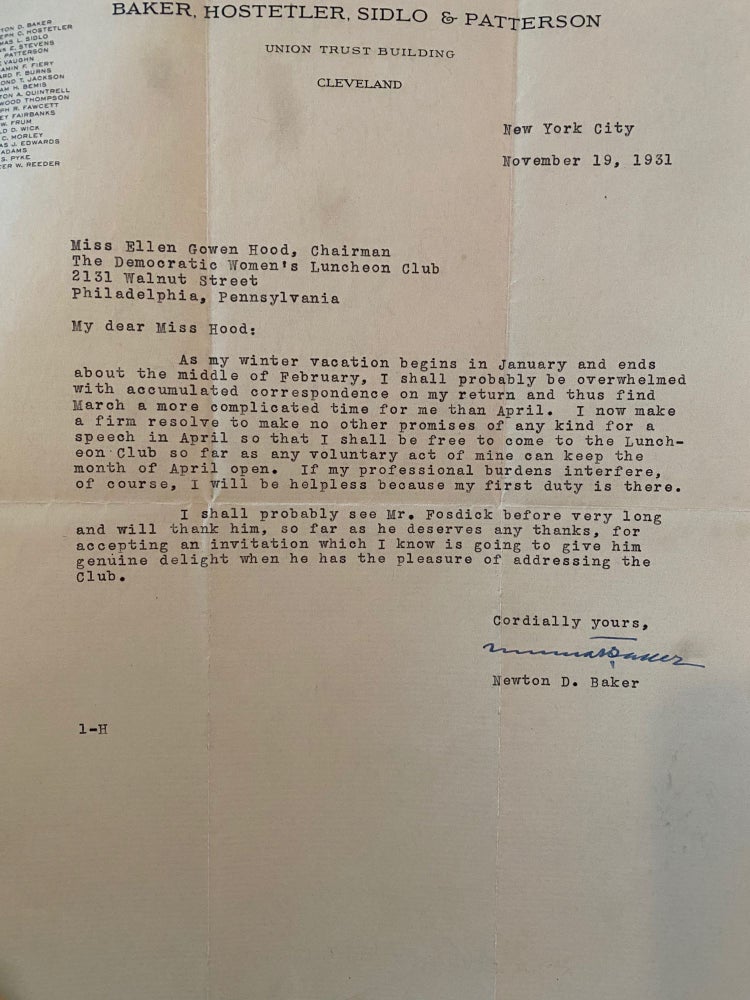
Archive of Incoming Correspondence of Ellen Gowen Hood of the Democratic Women’s Luncheon Club of Philadelphia, From Colleagues Including Newton Baker, 1920s-1940s.
V.P. 1920s-1940s. With fifty-eight letters from Newton Baker, 1924-1937. Generally fine condition. Item #List1819
Ellen Gowen Hood was active in the Democratic party at both the local and national levels. An obituary from the Philadelphia Daily News in 1970 described her as “one of the earliest local advocates of women in politics.” She was the chairman of the Democratic Women’s Luncheon Club of Philadelphia for 20 years, and had regular correspondence with women such as Edith Bolling Wilson and Eleanor Roosevelt.
Democratic women’s clubs became active across the country after the 19th amendment passed in 1920, and the democratic party sought to mobilize women voters. As chairman of the Democratic Women’s Luncheon Club of Philadelphia, Hood organized events with prominent political speakers and then had the speeches printed in book format. Without Hood’s side of the correspondence, we don’t get insight into her philosophy of women’s participation in politics. We do, however, get a sense for the role that the club played in the Democratic Party. Baker was a periodic guest of the luncheon club, and in his letters he praised the organization, saying “I think I have never addressed a more intelligent or obviously influential audience,” and "I think there is no more useful forum anywhere. They print the addresses made at their luncheons and give them a wide circulation throughout the country, so that their pamphlets are now in libraries and in the hands of studious and thoughtful people everywhere." As an avid supporter of Wilsonian ideas and the League of Nations, Hood’s political intention with the club seems more focused on bringing speakers that would highlight those causes, than specifically speaking to women’s participation in politics.
The letters from Baker to Hood reveal their shared political beliefs and goals. Their letters are ongoing conversations about the League of Nations and the World Court; the Democratic Conventions in 1924, 1928, and 1932; and how democrats should govern following the Great Depression and prohibition. Baker frequently recommends essays and speeches for Hood to read, and also helps connect her with potential speakers for the Luncheon Club. He addresses her as a political peer, and we also get a sense of her professional persistence and savvy -- in nearly every letter for twenty years, Baker responds to her requests for him to come and speak at the club.
The letters give insight into Baker’s political beliefs as they evolve through the 1920s and 1930s. In the 20s-30s, he writes as his thinking on the League of Nations changes from strongly feeling that the United States should join, to discouraging it until there is complete support. In one letter, Baker describes, in confidence, one of the only times he disagreed with President Wilson as Secretary of War -- when Wilson sent American troops to North Russia at the end of World War I. In a few memorable letters from 1932, Baker writes about his experience of the 1932 democratic convention, and his sense of relief when he was not chosen for nomination.
The letters also exhibit Baker’s writing style and his tendency to wax poetic about democratic politics. For example, speaking about the limitations of the Democratic Party, he writes, “The trouble about it all is that nobody has yet invented anything better for the long run and the steady pull than democracy, and so we just have to be patient with it as we are with the small misdoings of our children and take our joy out of the sure forecast of their fine performance when they have matured.”
Other correspondences in the collection include letters from Edith Bolling Wilson, Eleanor Roosevelt, Secretary of State Cordell Hull, historian and diplomat Claude Bowers, and Bess Truman. There are also several letters from Ralph Hayes, Baker’s wartime secretary in the war department and a central figure in Baker’s 1932 presidential campaign. These letters go into detail about Baker’s role at the 1932 convention, his legacy on labor issues, and a rumor that he was Jewish.
Overall the collection provides insight into Democratic Women’s Clubs of the period. We suspect the Baker letters to exist in duplicate at his archive, but the collection still provides a succinct opportunity for research on the subject.
Please contact us for a full inventory.
Price: $3,000.00


